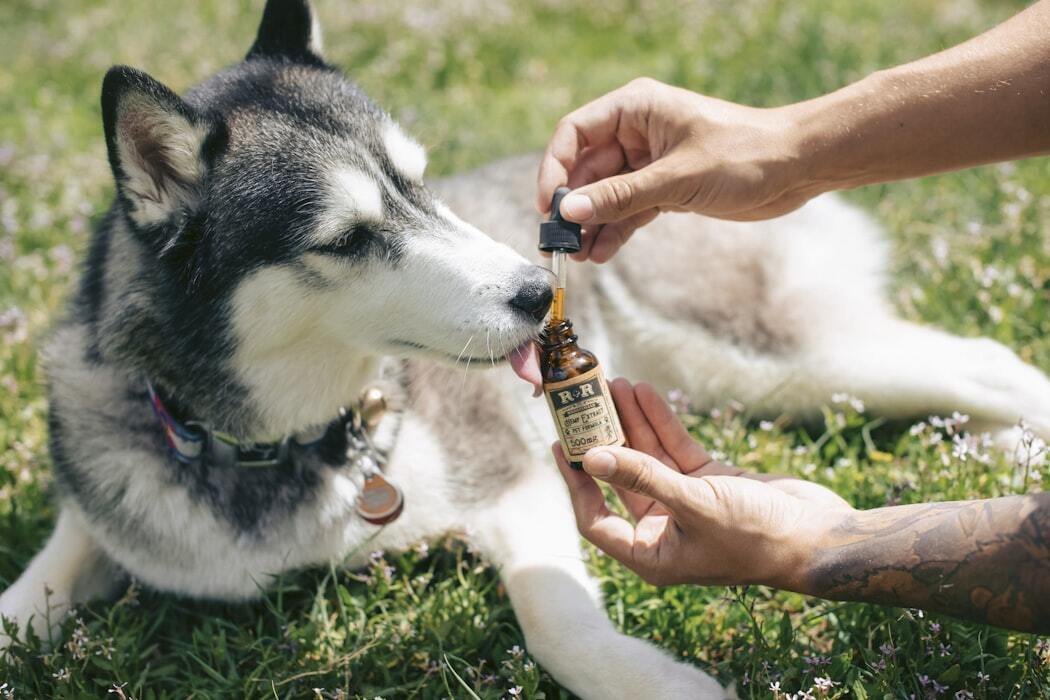- The endocannabinoid system (ECS), which regulates the functions of cannabinoids, works in the same way among all mammals, like humans and dogs(1). Thus, results may be similar when CBD (cannabidiol) is given to dogs.
- According to American Kennel Club (AKC)’s Chief Veterinary Officer, CBD is used in dogs because of its anti-inflammatory properties, cardiac benefits, anti-nausea effects, appetite stimulation, anti-anxiety impact, and possible anti-cancer benefits(2).
- The first scientific research conducted on CBD oil use in pets is the 2017 Cornell University study, where CBD oil was given to dogs with osteoarthritis(3).
- In a 2016 study, hemp-based CBD dog treats consumption was thought to relieve joint pain, inflammation, anxiety and phobia, digestive system issues, and pruritus (itching)(4).
- Given that CBD shares metabolic pathways with anti-inflammatory drugs, it may also help with certain inflammatory conditions in dogs(5). However, there is still no definitive scientific data on using CBD to relieve pain and inflammation in dogs(6).
See the Best CBD Oil for Dogs in 2022
Best CBD Oils For Dogs
Why Dog Owners Are Turning to CBD Oil for Dogs
CBD, a cannabinoid derived from hemp, is studied for its potential anti-inflammatory properties, cardiac benefits, appetite stimulation, and anti-anxiety impact.
Dr. Jerry Klein, Chief Veterinary Officer of American Kennel Club (AKC), said that CBD might also have possible anti-cancer benefits, although there is no conclusive data on this use(7).
There is also anecdotal evidence from dog owners suggesting CBD can treat pain, especially neuropathic pain, and help control seizures, Klein added.
However, there is still no definitive scientific data on using CBD to alleviate these conditions in dogs(8).
Meanwhile, there have been studies done on humans and animals, like rats and mice, that show the health benefits of CBD oil.
Potential Therapeutic Benefits of CBD Oil for Dogs
The mechanism behind CBD’s therapeutic potential in dogs is attributed to how cannabinoids influence the endocannabinoid system (ECS).
According to a study shared in the PLOS One Journal, several dogs’ conditions share striking similarities with their human counterparts(9).
The researchers examined the spatial distribution of cannabinoid receptor type 1 (CB1) in healthy canines’ central and peripheral nervous systems and compared them with humans and other mammals.
The similarities were also highlighted in a review shared in the Animals (Basel) Journal(10). Based on the author’s research, it is apparent that the endocannabinoid system is not only found in mammals but nearly all animals.
The ECS has an integral role in maintaining homeostasis (natural balance) for some organ systems.
CBD for Arthritis and Inflammation in Dogs
The first scientific research conducted on CBD oil use in pets is the 2018 study sponsored by Cornell University, where CBD oil was given to dogs with osteoarthritis(11).
The study mentioned that consuming hemp-based CBD dog treats was thought to relieve joint pain, inflammation, anxiety and phobia, digestive system issues, and pruritus (itching)(12).
Results concluded that CBD oil might increase the dogs’ relief and activeness.
Given that CBD shares metabolic pathways with anti-inflammatory drugs, it may also help with dogs’ inflammatory conditions(13).
A study published by the Veterinary Science Development noted that one in every four dogs in the USA is diagnosed with arthritis(14).
The 2018 Cornell research showed that CBD might help provide substantial pain relief to dogs with arthritis when given in appropriate doses twice a day(15).
CBD for Dog Anxiety
One common problem that dogs experience is anxiety. Furthermore, separation-anxiety has been observed to cause unwanted behavior, such as excessive vocalization and property destruction(16).
A review shared in the Neurochemical Research Journal indicated that CBD could block the serotonin reuptake in the brain, making it more available for the body(17).
Serotonin is a hormone that impacts the body and psychological functions and influences levels of mood, anxiety, and happiness.
The researchers suggested that regulating serotonin with CBD may help stabilize mood and reduce anxiety.
In the Translational Psychiatry journal, a study demonstrated CBD’s ability to trigger the ECS to produce more natural cannabinoids, like anandamide, which regulates emotions(18).
Increased anandamide in the brain inhibits the effects of stress and reduces behavioral signs of anxiety and fear, according to a study on rats published in the Journal of Neuroscience(19).
Meanwhile, a study done on rats and mice found that cannabinoids, particularly CBD and THC (tetrahydrocannabinol), are useful in the management of difficult to treat pain(20).
Given how the endocannabinoid system (ECS), which regulates the functions of cannabinoids, works in the same way among all mammals, CBD’s anti-anxiety and pain-relieving properties may also be beneficial to dogs.
CBD for Dog Aggression
Studies have shown that CBD may help curb fear and anxiety, which may reduce dog aggression.
Dogs that are anxious about an uncertain or unpleasant outcome may exhibit anxiety-related aggression.
A study from Frontiers in Pharmacology examined the effects of CBD on learned fear in anxiety-related disorders, including phobias and post-traumatic stress disorder (PTSD)(21).
Results indicated that CBD, a primary non-psychoactive component in Cannabis sativa, was useful in regulating fear.
Although the study was conducted on rodents, the results are still encouraging that CBD may help curb fear- or anxiety-related aggression in dogs.
CBD for Cancer in Dogs
By interacting with the dog’s ECS, CBD can help manage cancer symptoms, making it an alternative tool to improve the quality of life in dogs with cancer.
Studies have established the efficacy of cannabinoid agonists in reducing tumor growth and proliferation, according to a 2016 research that examined cannabinoids as anti-cancer agents(22).
Cannabinoid agonists are substances that initiate a physiological response when combined with a receptor.
A study published in the Journal of Neuroinflammation in 2017 showed that CB2 receptors contribute to the slowing down of chronic inflammatory processes and modulating chronic pain(23).
A study posted in the Journal of Pharmacology and Experimental Therapeutics mentioned that CBD might induce apoptosis in cancer cells via direct or indirect activation of the CB2 receptor(24). Results showed that CBD could act as an inhibitor of cancer cell growth.
The mentioned studies on CBD’s efficacy were conducted on humans and animal models (rats and mice), not dogs.
However, the endocannabinoid system (ECS), which regulates the functions of cannabinoids, works in the same way among all mammals(25). Therefore, the results may be similar when CBD is administered to dogs.
It is essential to consult with a licensed veterinarian knowledgeable in cannabis use before administering CBD products, regardless of form or dose, to dogs.
CBD for Epilepsy in Dogs
CBD has been shown to provide anti-convulsant effects. The Journal of the American Veterinary Medical Association published a 2019 study that tested CBD’s efficacy in alleviating canine idiopathic epilepsy symptoms(26).
According to the authors, CBD’s potential to reduce seizure frequency in dogs must be further explored by additional studies.
In human studies, CBD has been shown to reduce seizures in rare forms of child epilepsy. Epidiolex is the first CBD drug approved by the US food and Drug Administration (FDA)(27).
The AKC Canine Health Foundation (CHF) is sponsoring a study through the Colorado State University’s College of Veterinary Medicine and Biomedical Sciences to evaluate the use of CBD in treatment-resistant epileptic dogs.
In a 2019 article, the CHF expressed hope the study would be the first to gain scientific data on CBD use in dogs with this condition(28).
Risks and Side Effects of CBD Oil for Dogs
A study posted by Cannabis and Cannabinoid Research has reported that CBD may cause diarrhea, drowsiness, changes in appetite, dry mouth, and elevated liver enzymes in humans and animals(29).
A separate 2018 study observed that oral CBD administration in healthy dogs caused mild diarrhea. This side effect resulted from healthy dogs consuming 10 to 20 milligrams per kilogram (mg/kg) of CBD a day for six weeks(30).
Furthermore, a 2019 study shared by Molecules has shown how high CBD dosages caused hepatotoxicity (liver injury) in rats. The researchers administered 246 to 2,460 mg/kg a day to eight-week-old male mice for ten days(31).
Following the CBD administration, researchers observed that the mice displayed a significant increase in liver-to-body weight ratios.
CBD may also interact with medications. Moreover, testing of pet products is less prevalent than the testing of human products. There have been reports of animals negatively affected by spoiled or contaminated CBD products(32).
The FDA has not approved cannabis use in animals. The agency warns pet owners against using CBD products and recommends consultation with a veterinarian about appropriate treatment options for pets(33).
The American Veterinary Medical Association mentioned that under current federal law, veterinarians are prohibited from administering, prescribing, or recommending cannabis products for animals(34).
California is the only state that passed legislation authorizing veterinarians to discuss cannabis with their clients(35).
CBD Dosage for Dogs
In an article posted by Veterinary Cannabis Education and Consulting, pet parents are given guidelines on how much CBD oil may be given for a particular health issue(36).
However, the US Food and Drug Administration (FDA) has not approved CBD and has not issued a dosing chart for dogs(37).
Given these limitations, one does not know what size dosage would be toxic. Also, CBD may interact with other pharmaceuticals and cause side effects.
There are many factors involved in finding the most therapeutic dose of CBD for one’s dog. The dose can also depend on the dog’s weight, diet, and health condition.
When giving a dog something new, it is always advisable to start with small amounts and then carefully monitor the effects.
Dog owners must follow the instructions on dosing as per the brand’s recommendation and upon the advice of a licensed veterinarian experienced in cannabis use.
The pet parent’s primary responsibility is to inform the veterinarian about a plan to include CBD in the dog’s regimen while taking other medications.
How Dogs Can Take CBD Oil
CBD oil for pets may come in the form of CBD pet tincture that may be given orally, combined with pet food or treats, or used in massages.
There are also CBD hemp oil, topical creams, or balms that are excellent for dog owners who want to manage their dog’s rashes or muscle aches.
When administering CBD oil tincture to a dog for anxiety or other health issues, dog owners must start with the minimum dose and gradually increase to the target dose(38).
A marked dropper is recommended for consistent and accurate dosing.
It is crucial that dog owners know how much CBD is in each drop or milliliter of CBD tincture.
Pet owners who struggle with CBD tincture administration may mix tinctures into dog food or a favorite treat, such as peanut butter. Moreover, pet owners may opt for CBD treats and soft chews for dogs who do not like tinctures.
Dog owners must take notes of the pet’s progress, behavior, and reactions after CBD administration. This information must be shared with the veterinarian in charge of the dog’s therapy.
The amount of CBD needed to achieve potential benefits depend on the dog’s diagnosis, size, age, and other medical conditions.
FAQs
What is CBD Oil?
Cannabidiol (CBD) is a phytocannabinoid predominantly found in hemp plants. Aside from CBD, hemp also contains other cannabinoids, such as cannabigerol (CBG), cannabichromene (CBC), cannabinol (CBN), and tetrahydrocannabinol (THC).
The main types of CBD are full-spectrum CBD oil, broad-spectrum CBD oil, and CBD isolate.
Full-spectrum CBD oil contains all the cannabinoids, flavonoids, terpenes, and other compounds naturally present in cannabis plants, including other minerals, such as Omega-3 and Omega-6 fatty acids.
Terpenes are the compounds in cannabis that provide distinctive aromas and flavors, while flavonoids are responsible for most plants’ vivid colors.
Combining all these components creates a synergy known as the “entourage effect,” where all of the compounds working together are more efficient than their isolated elements(39).
Some products may be marketed as full-spectrum hemp, which may be similar to full-spectrum CBD, depending on its cannabinoid presence.
Broad-spectrum CBD oils are like full-spectrum oils that are THC-free or contain trace amounts (less than 0.3%) of THC. CBD isolates carry only isolated cannabidiol that is substantially pure CBD oil.
Not all oils are the same. Dog owners must only insist only on the highest quality of pet CBD oil to have a better chance of it working.
Is CBD Legal?
The 2018 United States Farm Bill legalized the cultivation of industrial hemp plants that contain 0.3% THC or less. Legitimate CBD oil products in the US are derived from industrial hemp from licensed farms.
Some individuals may confuse cannabis-derived CBD with marijuana-derived CBD. Marijuana and hemp are both classifications of Cannabis sativa. However, marijuana has a higher THC and low CBD content. Industrial hemp from licensed farms contains very low THC and a higher CBD concentration than marijuana. Unlike marijuana-derived CBD, hemp-derived CBD with less than 0.3% is legal in most states.
Some states, such as Idaho, require CBD products to be THC-free(40).
Although hemp-derived products are legal, the CBD industry is not fully regulated by any organization.
Pet owners must make sure that the CBD products they are buying are tested by third-party laboratories.
Third-party lab test results determine if the product does not contain harmful chemicals, such as pesticides, heavy metals, or residual solvents.
How to Find High-Quality CBD Oil?
When choosing among CBD brands, pet owners must consider several factors, such as carrier oil, source of the hemp extract, extraction method, and other ingredients.
Most pet owners prefer brands that use non-GMO and organic hemp. These features ensure the plant is all-natural and pesticides were not used in the growing process.
Pets may react to certain elements like gluten, additives, and preservatives. Thus, pet owners may opt for vegan or gluten-free dog treats made from natural ingredients.
CBD brands that use a clean extraction method, such as CO2 extraction, is ideal for pet owners who do not want any harsh chemicals. CO2 extraction does not use solvents or chemicals to separate the compounds.
Pet owners may also consider the carrier oil used by CBD tinctures. Some CBD tinctures are suspended in medium-chain triglycerides (MCT oil), olive oil, or hempseed oil.
Pet owners must be cautious as some dogs might have allergic reactions to certain oils.
Organic CBD brands with readily available third-party lab reports are ideal when shopping for the best CBD oil for dogs.
Companies that are confident with their high-quality products offer a 30-day money-back guarantee.
Do Vets Recommend CBD Oil for Dogs?
A study retrieved data from Veterinary Information Network to learn more about CBD’s status as an alternative remedy in the veterinary community.
The study indicated that out of 2,130 respondents, 61.5% felt comfortable discussing CBD with their colleagues, while only 45.5% were willing to discuss CBD with their clients(41).
The study added that the majority of vets (82.1%) do not prescribe CBD to clients.
Conclusion
As many CBD pet products become available, veterinarians witness an increasing interest among pet owners in using these products for their furry friends’ wellness.
However, most CBD studies were conducted on humans, mice, and rats, not dogs.
Dog owners should also note that CBD can also cause slight drowsiness when used in high doses. The other potential side effects of CBD use include dry mouth and lowered blood pressure.
A consultation with a veterinarian experienced in cannabis use is an essential step for dog owners before giving CBD hemp products.
- McPartland JM, Matias I, Di Marzo V, Glass M. Evolutionary origins of the endocannabinoid system. Gene. 2006;370:64-74.DOI:https://doi.org/10.1016/j.gene.2005.11.004.
- Kriss R. (2019, Oct 27). The American Kennel Club. CBD Oil for Dogs: What You Need to Know. Retrieved from https://www.akc.org/expert-advice/health/cbd-oil-dogs/.
- Gamble LJ, Boesch JM, Frye CW, et al. Pharmacokinetics, Safety, and Clinical Efficacy of Cannabidiol Treatment in Osteoarthritic Dogs. Front Vet Sci. 2018;5:165. Published 2018 Jul 23. DOI:10.3389/fvets.2018.00165.
- Kogan LR, Hellyer PW, Robinson NG. Consumers’ perceptions of hemp products for animals. J Am Holist Vet Med Assoc. (2016) 42:40–8.
- MedlinePlus. (2020, Jan 21).Cannabidiol (CBD). Retrieved from https://medlineplus.gov/druginfo/natural/1439.html.
- Kriss R. (2019, Oct 27). Op.cit.
- Ibid.
- Ibid.
- Freundt-Revilla J, Kegler K, Baumgärtner W, Tipold A (2017) Spatial distribution of cannabinoid receptor type 1 (CB1) in normal canine central and peripheral nervous system. PLoS ONE 12(7): e0181064.
- Silver RJ. The Endocannabinoid System of Animals. Animals (Basel). 2019;9(9):686. Published 2019 Sep 16. DOI:10.3390/ani9090686.
- Gamble LJ, Boesch JM, Frye CW, et al. Pharmacokinetics, Safety, and Clinical Efficacy of Cannabidiol Treatment in Osteoarthritic Dogs. Front Vet Sci. 2018;5:165. Published 2018 Jul 23. DOI:10.3389/fvets.2018.00165.
- Ibid
- MedlinePlus. (2020, Jan 21).Cannabidiol (CBD). Retrieved from https://medlineplus.gov/druginfo/natural/1439.html.
- Clark, Stephanie. (2015). Canine Osteoarthritis and Treatments: A Review. Veterinary Science Development. 5. 10.4081/vsd.2015.5931.
- Gamble LJ, Boesch JM, Frye CW, et al. (2018). Op cit.
- Sargisson R. Canine separation anxiety: strategies for treatment and management. Vet Med (Auckl). 2014;5:143-151. https://doi.org/10.2147/VMRR.S60424
- Russo, E.B., Burnett, A., Hall, B. et al. Agonistic Properties of Cannabidiol at 5-HT1a Receptors. Neurochem Res 30, 1037–1043 (2005). https://doi.org/10.1007/s11064-005-6978-1.
- Leweke FM, Piomelli D, Pahlisch F, et al. Cannabidiol enhances anandamide signaling and alleviates psychotic symptoms of schizophrenia. Transl Psychiatry. 2012;2(3):e94. Published 2012 Mar 20. DOI:10.1038/tp.2012.15.
- Morena M., Aukema, R., […], and Hill M. Upregulation of Anandamide Hydrolysis in the Basolateral Complex of Amygdala Reduces Fear Memory Expression and Indices of Stress and Anxiety. Journal of Neuroscience 13 February 2019, 39 (7) 1275-1292; DOI: https://doi.org/10.1523/JNEUROSCI.2251-18.2018.
- Russo EB. Cannabinoids in the management of difficult to treat pain. Ther Clin Risk Manag. 2008;4(1):245–259. DOI:10.2147/tcrm.s1928.
- Jurkus R, Day HL, Guimarães FS, Lee JL, Bertoglio LJ, Stevenson CW. Cannabidiol Regulation of Learned Fear: Implications for Treating Anxiety-Related Disorders. Front Pharmacol. 2016;7:454. Published 2016 Nov 24. DOI:10.3389/fphar.2016.00454.
- Ladin DA, Soliman E, Griffin L, Van Dross R. Preclinical and Clinical Assessment of Cannabinoids as Anti-Cancer Agents. Front Pharmacol. 2016;7:361. Published 2016 Oct 7. DOI:10.3389/fphar.2016.00361.
- Niu J, Huang D, Zhou R, et al. Activation of dorsal horn cannabinoid CB2 receptor suppresses the expression of P2Y12 and P2Y13 receptors in neuropathic pain rats. J Neuroinflammation. 2017;14(1):185. Published 2017 Sep 12. DOI:10.1186/s12974-017-0960-0.
- Alessia Ligresti, Aniello Schiano Moriello, Katarzyna Starowicz, Isabel Matias, Simona Pisanti, Luciano De Petrocellis, Chiara Laezza, Giuseppe Portella, Maurizio Bifulco and Vincenzo Di Marzo. Antitumor Activity of Plant Cannabinoids with Emphasis on the Effect of Cannabidiol on Human Breast Carcinoma. Journal of Pharmacology and Experimental Therapeutics September 1, 2006, 318 (3) 1375-1387; DOI: https://doi.org/10.1124/jpet.106.105247.
- McPartland JM, Matias I, Di Marzo V, Glass M. Evolutionary origins of the endocannabinoid system. Gene. 2006;370:64-74. DOI:https://doi.org/10.1016/j.gene.2005.11.004.
- McGrath, S., Bartner, L. R., Rao, S., Packer, R. A., & Gustafson, D. L. (2019). Randomized blinded controlled clinical trial to assess the effect of oral cannabidiol administration in addition to conventional antiepileptic treatment on seizure frequency in dogs with intractable idiopathic epilepsy. Journal of the American Veterinary Medical Association, 254(11), 1301–1308.
- The US Food and Drug Administration. FDA Approves First Drug Comprised of Active Ingredient from Cannabis. Retrieved from https://www.fda.gov/news-events/press-announcements/fda-approves-first-drug-comprised-active-ingredient-derived-marijuana-treat-rare-severe-forms
- CHF Announces Funding for Clinical Trial to Study Cannabidiol to Treat Drug Resistant Epilepsy in Dogs. Retrieved from https://www.akcchf.org/news-events/news/clinical-trial-to-study.html
- Iffland, K., & Grotenhermen, F. (2017). An Update on Safety and Side Effects of Cannabidiol: A Review of Clinical Data and Relevant Animal Studies. Cannabis and cannabinoid research, 2(1), 139–154. https://doi.org/10.1089/can.2016.0034
- McGrath S, Bartner LR, Rao S, Kogan LR, Hellyer PW. A report of adverse effects associated with the administration of cannabidiol in healthy dogs. J Am Holist Vet Med Assoc. 2018;52:34–38.
- Ewing, L. E., Skinner, C. M., Quick, C. M., Kennon-McGill, S., McGill, M. R., Walker, L. A., ElSohly, M. A., Gurley, B. J., & Koturbash, I. (2019). Hepatotoxicity of a Cannabidiol-Rich Cannabis Extract in the Mouse Model. Molecules (Basel, Switzerland), 24(9), 1694. https://doi.org/10.3390/molecules24091694
- Peachman, RR. (2019, April 11). Should You Try CBD for Your Pet? Retrieved from https://www.consumerreports.org/cbd/should-you-try-cbd-for-your-pet/
- US FDA. (2020, March 11). FDA Regulation of Cannabis and Cannabis-Derived Products, Including Cannabidiol (CBD). Retrieved from https://www.fda.gov/news-events/public-health-focus/fda-regulation-cannabis-and-cannabis-derived-products-including-cannabidiol-cbd
- Burke, A. (2018, Oct 17). How to Talk to Your Veterinarian About CBD Oil. Retrieved from https://www.akc.org/expert-advice/health/talk-veterinarian-cbd-oil/
- Peachman, RR. (2019, April 11). Op cit.
- Veterinary Cannabis Education and Consulting. Cannabis Guidelines for Pet Parents. Retrieved from https://www.veterinarycannabis.org/guidelines-for-pet-parents.html
- Kriss R. (2019, Oct 27). The American Kennel Club. CBD Oil for Dogs: What You Need to Know. Retrieved from https://www.akc.org/expert-advice/health/cbd-oil-dogs/
- Kriss R. (2019, Oct 27). Op.cit.
- Russo EB. The Case for the Entourage Effect and Conventional Breeding of Clinical Cannabis: No “Strain,” No Gain. Front Plant Sci. 2019;9:1969. Published 2019 Jan 9. DOI:10.3389/fpls.2018.01969.
- Idaho Office of Drug Policy. Retrieved from https://odp.idaho.gov/cannibidiol/
- Kogan, L., Schoenfeld-Tacher, R., Hellyer, P., & Rishniw, M. (2019). US Veterinarians’ Knowledge, Experience, and Perception Regarding the Use of Cannabidiol for Canine Medical Conditions. Frontiers in veterinary science, 5, 338. https://doi.org/10.3389/fvets.2018.00338















































